
- Retrait gratuit dans votre magasin Club
- 7.000.000 titres dans notre catalogue
- Payer en toute sécurité
- Toujours un magasin près de chez vous
- Retrait gratuit dans votre magasin Club
- 7.000.0000 titres dans notre catalogue
- Payer en toute sécurité
- Toujours un magasin près de chez vous
Description
The rapid evolution of technical capabilities in the systems engineering (SE) community requires constant clarification of how to answer the following questions:
What is Systems Architecture?
How does it relate to Systems Engineering?
What is the role of a Systems Architect?
How should Systems Architecture be practiced?
A perpetual reassessment of concepts and practices is taking place across various systems disciplines at every level in the SE community.
Architecture and Principles of Systems Engineering addresses these integral issues and prepares you for changes that will be occurring for years to come. With their simplified discussion of SE, the authors avoid an overly broad analysis of concepts and terminology. Applying their substantial experience in the academic, government, and commercial R&D sectors, this book is organized into detailed sections on:
- Foundations of Architecture and Systems Engineering
- Modeling Languages, Frameworks, and Graphical Tools
- Using Architecture Models in Systems Analysis and Design
- Aerospace and Defense Systems Engineering
Describing ways to improve methods of reasoning and thinking about architecture and systems, the text integrates concepts, standards, and terminologies that embody emerging model-based approaches but remain rooted in the long-standing practices of engineering, science, and mathematics. With an emphasis on maintaining conceptual integrity in system design, this text describes succinct practical approaches that can be applied to the vast array of issues that readers must resolve on a regular basis.
An exploration of the important questions above, this book presents the authors' invaluable experience and insights regarding the path to the future, based on what they have seen work through the power of model-based approaches to architecture and systems engineering.
Spécifications
Parties prenantes
- Auteur(s) :
- Editeur:
Contenu
- Nombre de pages :
- 496
- Langue:
- Anglais
- Collection :
Caractéristiques
- EAN:
- 9781420072532
- Date de parution :
- 19-11-09
- Format:
- Livre relié
- Format numérique:
- Genaaid
- Dimensions :
- 157 mm x 236 mm
- Poids :
- 771 g

Les avis
Nous publions uniquement les avis qui respectent les conditions requises. Consultez nos conditions pour les avis.






